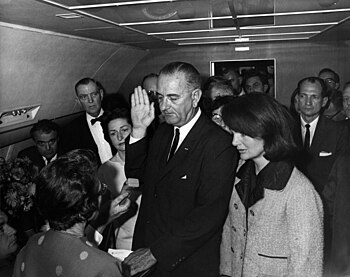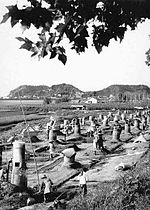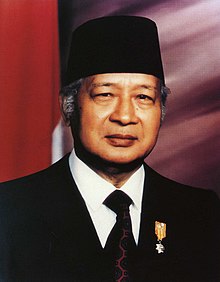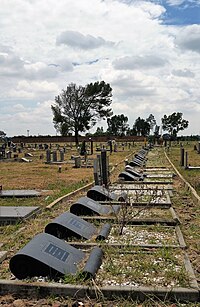The 1960s Portal
The 1960s became synonymous with the new, radical, and subversive events and trends of the period. In Africa the 1960s was a period of radical political change as 32 countries gained independence from their European colonial rulers. Some commentators have seen in this era a classical Jungian nightmare cycle, where a rigid culture, unable to contain the demands for greater individual freedom, broke free of the social constraints of the previous age through extreme deviation from the norm. Christopher Booker charts the rise, success, fall/nightmare and explosion in the London scene of the 1960s. However, this alone does not explain the mass nature of the phenomenon. Several nations such as the U.S., France, Germany and Britain turned to the left in the early and mid 1960s. In the United States, John F. Kennedy, a Keynesian and staunch anti-communist, pushed for social reforms. His assassination in 1963 was a stunning shock. Liberal reforms were finally passed under Lyndon B. Johnson including civil rights for African Americans and healthcare for the elderly and the poor. Despite his large-scale Great Society programs, Johnson was increasingly reviled by the New Left at home and abroad. The heavy-handed American role in the Vietnam War outraged student protestors across the globe, as they found peasant rebellion typified by Ho Chi Minh and Che Guevara more appealing. Italy formed its first left-of-center government in March 1962 with a coalition of Christian Democrats, Social Democrats, and moderate Republicans. Socialists joined the ruling block in December 1963. In Britain, the Labour Party gained power in 1964. In Brazil, João Goulart became president after Jânio Quadros resigned. This is a
Featured article, which represents some of the best content on English Wikipedia..
The 1962 Tour de France was the 49th edition of the Tour de France, one of cycling's Grand Tours. The 4,274-kilometre (2,656 mi) race consisted of 22 stages, including two split stages, starting in Nancy on 24 June and finishing at the Parc des Princes in Paris on 15 July. There were four time trial stages and no rest days. After more than 30 years, the Tour was again contested by trade teams instead of national teams. Jacques Anquetil of the Saint-Raphaël–Helyett–Hutchinson team won the overall general classification, defending his title to win his third Tour de France. Jef Planckaert ( Flandria–Faema–Clément) placed second, 4 min 59 s in arrears, and Raymond Poulidor ( Mercier–BP–Hutchinson) was third, over ten minutes behind Anquetil. Anquetil's teammate Rudi Altig took the first general classification leader's yellow jersey after winning the first stage. He lost it the following day to André Darrigade of Gitane–Leroux–Dunlop–R. Geminiani, who won stage 2a, before regaining it after winning stage three. The lead was taken by Saint-Raphaël rider Albertus Geldermans after stage six. He held it for two stages, before Darrigade took it back for the next two. Flandria rider Willy Schroeders then led the race between the end of stage nine to the end of eleven, at which point Schroeders' teammate Rik Van Looy, a major pre-race favourite, abandoned the race with an injury. The following day, British rider Tom Simpson (Gitane–Leroux) became the first rider from outside mainland Europe in history to wear the yellow jersey. He lost it to Planckaert after stage thirteen's individual time trial to Superbagnères in the Pyrenees. He held the lead for seven stages, which included the Alps. Anquetil's victory in the individual time trial of stage twenty put him in the yellow jersey, which he held until the conclusion of the race. ( Full article...)This is a
Good article, an article that meets a core set of high editorial standards.
The Indiana State Fairgrounds Coliseum gas explosion took place in Indianapolis, Indiana, United States, on October 31, 1963; 81 people died and about 400 others were injured. It was one of the worst disasters in the history of the state. On the night of October 31, over 4,000 people were in the Indiana State Fairgrounds Coliseum to watch a Holiday on Ice performance. While this was happening, liquefied petroleum gas was leaking from a tank that was stored with several others in a supply room underneath a part of the grandstands. Shortly after 11 p.m. ET, the gas came into contact with an electrical heating element from the concessions area, causing a major explosion that killed many seated above the room and caused significant damage to the stands. After the initial blast, while people were evacuating, a second blast caused by the remaining, unexploded tanks caused further destruction. Firefighters and other emergency responders were at the site within minutes and survivors were transported via ambulance to various hospitals in the area. The gas tanks were discovered by firefighters during cleanup operations and later testing revealed that they were the cause of the explosion. ( Full article...)Selected picture -
Lyndon B. Johnson taking the
U.S. Presidential Oath of Office on
Air Force One following the
assassination of John F. Kennedy in
Dallas on November 22, 1963. He was sworn in by Judge
Sarah T. Hughes, making him the first President sworn in by a woman. Johnson was not sworn using a
Bible; none could be found aboard the plane. A Roman Catholic
Missal was discovered in Kennedy's desk, and this book was used during the swearing-in ceremony.
Did you know -
Related portalsThis is a
Featured article, which represents some of the best content on English Wikipedia..
Peter Sellers CBE (born Richard Henry Sellers; 8 September 1925 – 24 July 1980) was an English actor and comedian. He first came to prominence performing in the BBC Radio comedy series The Goon Show. Sellers featured on a number of hit comic songs, and became known to a worldwide audience through his many film roles, among them Chief Inspector Clouseau in The Pink Panther series. Born in Southsea, Sellers made his stage debut at the Kings Theatre, Southsea, when he was two weeks old. He began accompanying his parents in a variety act that toured the provincial theatres. He first worked as a drummer and toured around England as a member of the Entertainments National Service Association (ENSA). He developed his mimicry and improvisational skills during a spell in Ralph Reader's wartime Gang Show entertainment troupe, which toured Britain and the Far East. After the war, Sellers made his radio debut in ShowTime, and eventually became a regular performer on various BBC radio shows. During the early 1950s, Sellers, along with Spike Milligan, Harry Secombe and Michael Bentine, took part in the successful radio series The Goon Show, which ended in 1960. ( Full article...)
This is a
Good article, an article that meets a core set of high editorial standards.
Suharto ( /suːˈhɑːrtoʊ/ soo-HAR-toh, Indonesian: [suˈharto] ⓘ; 8 June 1921 – 27 January 2008) was an Indonesian military officer and politician, who served as the second and the longest serving president of Indonesia. Widely regarded as a military dictator by international observers, Suharto led Indonesia as an authoritarian regime from the fall of his predecessor Sukarno in 1967 until his resignation in 1998 following nationwide unrest. His 31-year dictatorship is considered one of the most brutal and corrupt of the 20th century, as he was central to the perpetration of mass killings against alleged communists, ethnic Chinese, irreligious people and trade unionists. Suharto was born in the small village of Kemusuk, in the Godean area near the city of Yogyakarta, during the Dutch colonial era. He grew up in humble circumstances. His Javanese Muslim parents divorced not long after his birth, and he lived with foster parents for much of his childhood. During the Japanese occupation era, Suharto served in the Japanese-organized Indonesian security forces. During Indonesia's independence struggle, he joined the newly formed Indonesian Army. There, Suharto rose to the rank of major general some time after full Indonesian independence was achieved. ( Full article...)
Selected article -The Sharpeville massacre occurred on 21 March 1960 at the police station in the township of Sharpeville in the then Transvaal Province of the then Union of South Africa (today part of Gauteng). After demonstrating against anti-black pass laws, a crowd of about 7,000 black protesters went to the police station. Sources disagree as to the behaviour of the crowd: some state that the crowd was peaceful, while others state that the crowd had been hurling stones at the police and that the mood had turned "ugly". The South African Police (SAP) opened fire on the crowd when the crowd started advancing toward the fence around the police station; tear-gas had proved ineffectual. There were 249 victims in total, including 29 children, with 69 people killed and 180 injured. Some were shot in the back as they fled. The massacre was photographed by photographer Ian Berry, who initially thought the police were firing blanks. In present-day South Africa, 21 March is commemorated as a public holiday in honour of human rights and to commemorate the Sharpeville massacre. ( Full article...)More Did you know (auto generated)
TopicsCategoriesWikiProjects
Associated WikimediaThe following Wikimedia Foundation sister projects provide more on this subject:
Discover Wikipedia using
portals |





























